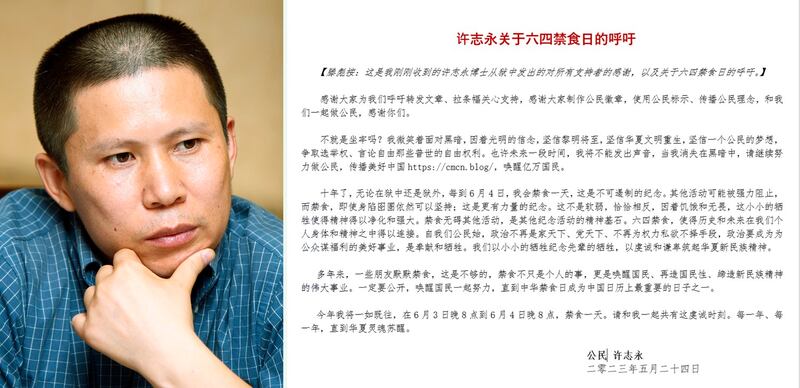Jailed rights activist Xu Zhiyong has called on the Chinese people to mark the 1989 Tiananmen massacre that ended weeks of pro-democracy protests with a day of fasting, in an impassioned plea from his prison cell to citizens to keep up the fight for freedom and democracy.
“I have fasted for a day on June 4 every year over the past decade, in prison and outside," Xu said in a letter from prison posted to the Weiquanwang rights website, and to the Twitter account of U.S.-based fellow activist Teng Biao.
"Others have also fasted over the years, but silently."
Public mourning for victims and discussion of the events of spring and summer 1989 are banned, and references to June 4, 1989, blocked, filtered or deleted by the Great Firewall of government internet censorship.
Xu Guang, a former student leader of the 1989 protest movement at Hangzhou University, stood trial in the eastern province of Zhejiang in April for "picking quarrels and stirring up trouble," a charge frequently used to target peaceful critics of the ruling Chinese Communist Party, after he refused food and drink in detention to commemorate the Tiananmen massacre.
According to Xu Zhiyong, fasting on the massacre anniversary should become more widespread, despite the risks.
"Fasting isn't just a personal thing -- it should awaken people, rebuild the national character and create a new national spirit," Xu wrote.
"We should make it a public affair, and work together to awaken the [Chinese] people."
Xu also appeared to warn of potential retaliation against himself following his letter.
"I may fall silent for some time after this," he said. "When I disappear into the darkness, please continue to work hard as citizens, and fight for universal suffrage and freedom of speech."
Xu said he remains optimistic that such action will work.
"Faced with this darkness, I firmly believe that the dawn will come," he said, adding that fasting on June 4 "connects people with the past and commemorates the sacrifices of our ancestors."

Teng said he and Xu Zhiyong were in high school when the 1989 democracy movement was at its height, and had found it inspiring.
"June 4, 1989 was an extremely important and profoundly influential event in Chinese politics," he said. "It still has a profound impact on China, even though 34 years have passed."
"It will never be a thing of the past."
Teng likened Xu's call to fast on Sunday's anniversary to the actions of Mahatma Gandhi.
"Fasting is a very powerful action," he said. "The way Xu Zhiyong sees it, we must always remember this day, or this tragedy from history is likely to repeat itself."
He described Xu as "my best friend" and said he is concerned for his health in prison.
"The way the Chinese prison guards treat him is inhumane -- there are many ways to threaten and abuse prisoners," he said.
Luo Shengchun, wife of jailed rights attorney Ding Jiaxi, who was sentenced at the same time as Xu, said she believes her husband will refuse food in prison on June 4, as the couple had fasted together for many years while they were still together.
"He will probably keep it going ... he even did it while on residential surveillance at a designated location, and the policemen watching him didn't understand why he ate nothing on June 4," Luo said.
"This is the only thing we can all do together to commemorate June 4, 1989," she said.
In April, the Linshu County People's Court in the eastern province of Shandong handed down a 14-year jail term to Xu and a 12-year sentence to rights lawyer Ding, after finding them guilty of " subversion of state power" – a charge often used to target critics of the government – after they attended a 2019 dissident gathering.
Ding and Xu, the founder of the "New Citizens' Movement" campaign for government transparency, were detained after they attended a dinner with prominent activists in December 2019 in Xiamen, southeastern China.
Translated by Luisetta Mudie . Edited by Paul Eckert.
